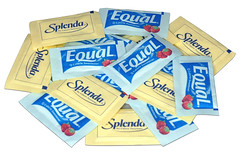As it seems, this is obvious and straightforward. Eat less weigh less. A concept that I believe is true on paper but not necessarily so simple when it comes to real life. A new recently published study suggests that if you use artificial sweeteners for the purpose of weight loss, you may be causing a metabolic issue that leads to weight gain.
In the past you may have heard that using non-calorie sweeteners ( lowers calories consumed for that food item consumed) can cause an increase in the amount of total calories consumed over the course of a day because the intensity in sweetness (200-8,000 times greater than natural sugar, http://en.wikipedia.org/wiki/Sugar_substitute) without calories triggers signals that increase appetite.
Researchers at Purdue University found that, “artificial sweeteners may disrupt the body’s natural ability to “count” calories based on foods’ sweetness. This finding may explain why increasing numbers of people in the United States lack the natural ability to regulate food intake and body weight.” If you missed this, you may find this interesting, http://www.sciencedaily.com/releases/2004/06/040630081825.htm.
Now, there is more evidence to “eat clean” and avoid eating artificial anything. This new study compared weight gain in rats given sugar and another group eating non-calorie sweeteners. Calories were similar in both groups but more weight gain was seen in the group ingesting the artificial sweetener. The weight gain was attributed to metabolic changes, specifically there may be an alteration involved with lowering calorie expenditure or increasing fluid retention, http://www.ncbi.nlm.nih.gov/pubmed/23088901.
My opinion we didn’t really need this study, we are our own rats. We use the products and we are still obese.
There are numerous studies on the issue of weight gain attributed to artificial sweeteners that reduce total calories and carbohydrates for specific food items and why this happens. But it is important for you to know that it happens and if you cannot lose weight, this may be the reason. This is a scientific article that may take some translation by a doctor to fully understand, but if you can get anything from it, it is worth a read, http://www.ncbi.nlm.nih.gov/pmc/articles/PMC2892765/.
The calorie theory is inaccurate to say the least, as it is a general statement that does not apply specific foods/beverages, medications or health status to the equation making it almost useless. Unfortunately, most practitioners use the calorie theory as the gospel and fail to see the whole picture leaving the typical patient or client with minimal hope of achieving weight loss goals.
“The global market for Artificial Sweeteners is projected to reach US$1.7 billion by the year 2018, primarily stimulated by widespread weight reduction efforts, development of low sugar food for diabetic and diet conscious consumers, growing preference for diet beverages, rising concerns over dental caries and the growing need to reduce risk associated with volatility in sugar prices,” http://www.prweb.com/releases/artificial_sweeteners/sucralose_aspartame/prweb10121807.htm. Lord, I hope the right people read this.
The message is clear, artificial sweeteners are a man-made creation that serve a business need and is quite successful in generating money but is unlikely serving the consumer interest if the goal is to lose weight and find an alternative to products that do not affect the blood sugar/insulin process.
Read labels to avoid non-calorie/low carb artificial sweeteners. Do not add packets to your foods or beverages either. Foods, beverages medicines and anything you consume should be natural.
If you want to avoid artificial sweeteners, read labels. Here is a list of some items to look for:
- Tylenol
- Dymadon
- Dimetapp
- toothpaste
- mouth wash
- gum
- foods labeled “diet” or “no sugar added”
- cereal
- soda
- crystal light
- desserts like jello, pudding, ice cream and baked goods
Any thoughts, or foods that we can add to the list?
Related articles
- Should You Choose Artificially Low Calorie Food To Help You Lose Weight Or Stick With Healthy? (snack-girl.com)
- Artificial Sweeteners Cause Greater Weight Gain than Sugar, Yet Another Study Reveals (articles.mercola.com)
- 11 Health Gimmicks You Should Stop Wasting Money On (businessinsider.com)








Thanks for the enlightening article. What do you think of Stevia? It’s works like no-calorie artificial sweeteners, but claims to be natural. Also, what do you think of Whey Low (www.wheylow.com) as it is also natural, but with 75% less calories and carbohydrate than table sugar. I would like to have some sweetness in my coffee, but not the carbs and calories.
Thank you Megan. Are you a carb/sugar addict? If so, “some” sweetness is what you need to avoid. Ideally I like to stay natural. Is using cream, cinnamon, nutmeg or any natural spice out of the picture? If so, and you just cannot live without it, I suggest using a variety of these options so that your body is not getting too much of anyone. My philosophy is small amounts are not as damaging as the cumulative damage of one particular sweetener day after day.
So essentially, these sweeteners make our brain think that we want more sweets. Then, we eat more calories based on these signals?
Three take home messages:
Calories signal your body to detremine fullness, no calories no signal…you may not eat more calories at that meal but you may eat more throughout the day because without calories your body did not register that you ate anything
The chemical make up of the actual artificial sweetener may negatively affect your metabolism
Some artificial sweeteners actually provoke an insulin and leptin response which have a negative response on metabolism, appetite, weight and blood sugar.